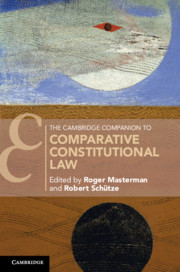Book contents
- Reviews
- The Cambridge Companion to Comparative Constitutional Law
- Cambridge Companions to Law
- The Cambridge Companion toComparative Constitutional Law
- Copyright page
- Contents
- Notes on Contributors
- Acknowledgements
- Table of Cases (Selection)
- Abbreviations
- Introduction
- Part I Theoretical Foundations
- Part II Historical Experiences
- Part III Constitutional Principles
- Part IV State Institutions
- Part V Transnational Constitutionalism
- 18 Multi-Layered Constitutions
- 19 International Constitutionalism
- 20 European Constitutionalism
- 21 A New Commonwealth Constitutionalism?
- 22 Constitutional Transplants
- Index
- References
22 - Constitutional Transplants
from Part V - Transnational Constitutionalism
Published online by Cambridge University Press: 30 September 2019
- Reviews
- The Cambridge Companion to Comparative Constitutional Law
- Cambridge Companions to Law
- The Cambridge Companion toComparative Constitutional Law
- Copyright page
- Contents
- Notes on Contributors
- Acknowledgements
- Table of Cases (Selection)
- Abbreviations
- Introduction
- Part I Theoretical Foundations
- Part II Historical Experiences
- Part III Constitutional Principles
- Part IV State Institutions
- Part V Transnational Constitutionalism
- 18 Multi-Layered Constitutions
- 19 International Constitutionalism
- 20 European Constitutionalism
- 21 A New Commonwealth Constitutionalism?
- 22 Constitutional Transplants
- Index
- References
Summary
This chapter investigates the problem of how the transplant and borrowing of foreign constitutional law and international law can influence constitution-making processes and constitutional interpretation – state actions which are still considered sovereign. International law, especially international human rights laws, are of pre-eminent importance in this context since they are virtually by definition based on limitations on national constitutional law to assert internationally shared constitutional principles. In other words, the chapter seeks to answer the question of how far the process of the internationalization of (national) constitutional law has progressed; to what extent are the framers of constitutions and the courts that interpret constitutions willing to accept alien, foreign, or international principles and rules? What underlies the decision by the constitutional organs of certain states to accede to such constitutional migration, and the rejection of such migration by their respective counterparts in other countries?
- Type
- Chapter
- Information
- Publisher: Cambridge University PressPrint publication year: 2019



